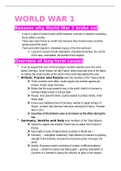WORLD WAR 1
Reasons why World War 1 broke out
A war is a state of violent armed conflict between countries or between competing
forces within a country
These wars were known as ‘world’ wars because they involved many countries
spread around the world.
There were both long-term, immediate causes of the first world war:
Long term causes include nationalism, industrial economies, the control
of the seas, colonisation, the decline of the empires.
Overview of long-term causes
It can be argued that none of the European countries wanted a war: But some
blame Germany, some Russia, her ally France, others have laid most of the blame
on Serbia (the small country at the centre of the event that sparked the war)
Britain, France and Russia were the members of the Triple Entente
Three countries were allies, would support one another against any
threats- mostly meant Germany.
Britain had the most powerful navy in the world- fearful of increase in
German military power in Europe itself.
Russia, most powerful Slavic country wanted to protect Serbia, small
Slavic state.
France was traditional rival of Germany, wanted to regain territory of
Alsace- Lorraine that Germany held since winning the Franco- Prussian
War in 1871
Countries of the Entente came to be known as the Allies during the
war.
Germany, Austria and Italy were members of the Triple Alliance
Agreed to support one another if there was an attack from France or
Russia.
Italy fought on side of triple Entente countries in World war 1
Germany strengthen weakening Triple Alliance (in reaction to growing
strength of the Entente), increase her economic power in Europe, the
world
Austria- European empire consisting of number of different national
groups afraid her empire was falling apart – growing nationalism of
countries in it (needed to stamp her authority on parts of her empire)
, The Ottoman Empire (Turkey) joined Triple Alliance (German pressure,
rivalry with Entente)- over Russia’s desire to take over the Straits near
Constantinople (Istanbul) that could connect Russia to the
Mediterranean Sea, threatened by Russians – and especially after the
war had started, Germany seemed to be in a strong position (looked to
Germany as an ally)
Members of the Alliance came to be known as the Central Powers
Nationalism
European countries established empires by colonising large parts of Africa, other
parts of the world- proud of their colonies, competitive about their empires.
Identifying with one’s country
Building a strong sense of community that unites all citizens
Developing a strong sense of national pride
Placing the interests of one’s own country before the interests of any other country
Nationalism develops because countries feel threatened in some way (threat
traditional values that’s held the society together breaking down, economy is
collapsing, people getting poorer, country-dangerous threat)
Nationalism= dangerous if taken too far- lead to aggressive attitude between
countries
By 1914 many of countries in Europe- nationalistic (wanted very powerful armies)
In 1914, Germany ruled by the Kaiser- strongest army, Britain- most powerful navy
in the world
Britain and Germany great rival powers- felt it necessary to increase their
army in self-defence if enemy increased military power in some way (called
an “arms race”)
Slavic people in Bosnia, Herzegovina- wanted to be free of foreign rule of Austria
(German-speaking country) wanted to grow closer to fellow Slavs in Serbia
Pan-Slavic (across all Slavs) nationalism led to assassination of the heir to the
Austrian throne – spark for FIRST WORLD WAR
Industrial economies
Some European countries (Britain, France, Germany) industrialised- strong
economies, built large armed forces.
, Some countries- not enough power to protect themselves= depended on
alliances of major powers e.g. Belgium relied on Britain
European countries measured wealth in terms of land, resources they owned in
their empires
Control of Seas
Fearful of increase in German Military power not only on land in Europe, but also
at sea.
At sea, Kaiser Wilhelm of Germany, his Minister of the Navy, Tirpitz set out to
build a powerful fleet able to rival Britain’s
Made Britain uneasy which led to the British government allying itself more
closely with France and Russia.
Colonisation and empires
In 1880s, Germany created colonies of German East Africa
Now Rwanda, Burundi, mainland part of Tanzania
German South-West Africa (now Namibia)
Kaiser Wilhelm ambitions to establish oversees empire- frustrated little, any
to expand
Most of the world available for colonisation in Africa, Asia, Pacific taken
over by other European powers France and Britain
Desire to assert both his own, Germany claim to be at least as powerful as
their rivals
Might have contributed to his being tempted to increase German power in
Europe
Immediate cause of World War 1
Assassination of Archduke of Austria at Sarajevo




